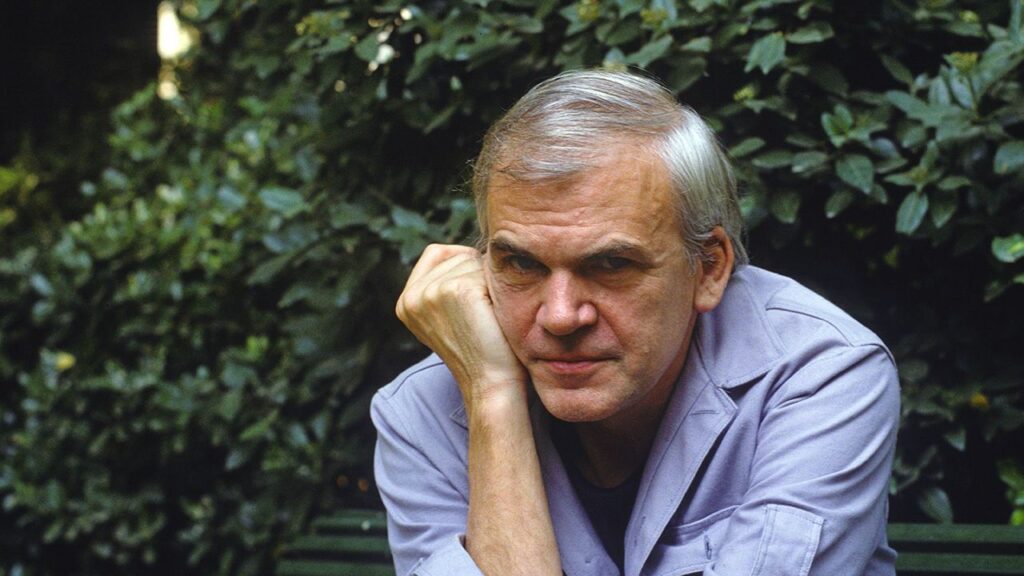
i.
Kundera almost killed me, still in my creative cradle, a writer needing nourishment.
He arrived in my life too early. As a reader, it wasn’t soon enough, as what relatively inexperienced but enthusiastic amateur—fresh from the front lines of grad school and adjusting to a world without texts to deconstruct—won’t benefit from that kind of sophisticated guidance, at any age? Still, as an aspiring writer, Kundera’s work had the odd effect of inspiring me, only too much. You read accumulated wisdom of this caliber and feel desperate, like a creature trudging through the heat in search of an oasis. Finally, you happen across a patch of water, lapping up every drop, half insane with relief and oblivious to the crocodiles lurking hungrily in the shallows.
Reading Kundera at any age, particularly as an aspiring writer with a future filed under “TBD,” you don’t just want to write like him, you want to be him. On some level you understand: in order to write like that you have to have lived like that. Eventually—and the sooner the better—you recognize it’s an impossibility and, choices narrowed to one, you lick your wounds and get on with the unbearable lightness of being yourself.
ii.
Context, of course, is everything.
I read Kundera in a pre-Internet world, and I wonder how disconsonant to our 21st Century insanity his work will be, going forward. Kundera, a man out of time is, in some ways, more easily connected—spiritually, aesthetically—to his heroes from centuries past than any of his peers, artistic or otherwise, today. He was an old soul, certainly, but a creative one; he undoubtedly ruffled the feathers of ancient gods, watching him with envy and pity as he encroached on the sublime, aloof from the mere mortals he walked amongst, no safe home here or in heaven.
His chief subject, he told the Paris Review, was not politics or social criticism but the “complexity of human existence in the modern world.”
It’s not coincidental that his best-loved books were written during years when intellectuals pondered if we’d lived through the end of history. No ivory tower elitist, he had dirt under his fingernails (at least figuratively) and knew what gunpowder smelled like; he also was talented and famous enough to remove himself (as the best artists aspire to do; the middling poseurs content with making as much money as possible) from the numbing grind, having the luxury to obsess about matters of the heart and mind. One imagines he never bothered to buy a computer or send an email.
If men of his time (and place) had seen the horrors of war and oppression up close, they also enjoyed the creative fruits of ennui. Being bored, they obsessed about the one thing any man, freed from worrying about food or work, focuses on: women. His novels will be uneasy reads for future generations, their female characters often anything but fully formed—at least in ways where their primary purpose is to serve or be adored (Kundera was not above cliché, speaking of women as muses and ostensibly intending it as a compliment).
One thing he could not be accused of, to his credit, is denial. As imperious and intolerant of convention as he could be, he knew what he was, and was refreshingly candid about his limitations. “Every one of my novels could be entitled The Unbearable Lightness of Being or The Joke or Laughable Loves,” he said. “They reflect the small number of themes that obsess me, define me and, unfortunately, restrict me. Beyond these themes, I have nothing else to say or to write.”
The best novelists, of course, combine the dispassionate insight of a historian, the elan of an iconoclast, and the empathy of a social worker. They are, as Shelley declared, our world’s unacknowledged legislators. Except they are, of course, acknowledged, and their work endures long past the expiration dates of celebrities, politicians, and professors. A more measured and succinct assessment, courtesy of another Great White Male from the old school, John Updike, who wrote “Kundera makes the life histories of most American writers look as stolid as the progress of a tomato plant, and it is small wonder that Kundera is able to merge personal and political significances with the ease of a Camus.”
iii.
In Testaments Betrayed Kundera explains his vision of the novelist’s acumen, which is “a considered, stubborn, furious nonidentification, conceived not as evasion or passivity but as resistance, defiance, rebellion.”
That’s about the best mission statement for any writer I’ve ever come across, and is the closest thing to personal mantra, or creed, that has consoled and inspired me, almost thirty years after I first read it. I came to appreciate Kundera as an ideal distillation of two other writers who did their best work last century, Martin Amis and Christopher Hitchens. In his art, which audaciously combined fiction, criticism, and philosophical ruminations, he seemed to possess Amis’s impeccable style and Hitchens’s indefatigable erudition, the wary traveler who’d seen and read everything, had an opinion about all of it, and steadfastly refused identification with any cause or tribe.
In The Book of Laughter and Forgetting, Kundera writes: The struggle of man against power is the struggle of memory against forgetting.
Perhaps, in an unwelcome, if sadly familiar and even predictable epoch wherein book banning on a mass scale has become a political barometer, and the cultural marketplace of ideas is intentionally flooded with noise, where info-overload is a default setting, where we’re always in danger of forgetting, we can return to Kundera. Maybe his work will find relevance—and resonance—in ways it wasn’t even a decade ago. It’s possible he will invariably be considered alongside Orwell and Kafka, who also depicted our seemingly unappeasable appetite for destruction. Kundera will remind us why we must laugh at the cynical, if deeply absurd agitators who divide us and thrive when we tend to forget.
